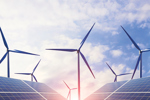Under the SDE Decree (Besluit stimulering duurzame energieproductie en klimaattransitie), subsidy is awarded to projects aimed at producing renewable energy or reduction of CO2-emissions on an annual basis. The SDE subsidy scheme is executed by the Dutch Enterprise Agency (Rijksdienst voor Ondernemend Nederland, RVO) on behalf of the Minister of Climate and Sustainable Growth. On 10 September 2024 the new application round will be opened. Subsequently, new sustainable energy production and climate transition projects will have the opportunity until 10 October 2024 to share in a total budget of EUR 11.5 billion in support.
Offsetting ‘excess profits’ of wind and solar projects against advance payments under SDE++ 2024
The European Commission published guidelines on state aid for climate, environmental protection and energy in 2022. The 2024 SDE++ framework was submitted for approval by the European Commission (EC). Further to certain attention points raised by the EC, the Dutch government has inter alia decided to introduce a setting-off mechanism in the SDE++ 2024 framework to ensure that the SDE++ subsidies granted shall be considered proportional under EU state aid regulations.
For now, the relevant mechanism has (only) been declared applicable to solar and wind projects. As a result, new SDE++ subsidized solar and wind projects will see so-called ‘excess profits’ being set-off against earlier advance payments during the lifetime of the subsidy, rather than at once at the final settlement on the maturity date of the subsidy. The setting-off mechanism entails the introduction of a revenue cap combined with certain yearly corrections of the base amount (or base electricity price) as used for the initial granting of the SDE++ subsidy. In essence: if revenue of a project (after corrections) exceeds the revenue cap within a given year, such ‘excess profits’ will be set-off against prior advance payments, or even future subsidy amounts (to the extent that ‘excess profits’ would exceed the total amount of advance payments received prior to that date).
If the sum of all subsidy awards during the entirety of the lifetime of an awarded SDE++ subsidy results in a negative outcome, the subsidy will eventually be settled at nil. Any repayments by a solar or wind project will never exceed amounts of advance payments received.
For the avoidance of doubt: this offsetting mechanism only applies to new SDE++ subsidies. The rules for subsidies granted during earlier rounds will not be altered.
Changes to banking mechanics: no more ‘backward banking’ and ex officio possibility for ‘forward banking’
In addition to the above, two changes to the banking mechanics for SDE++ subsidies are introduced in the 2024 subsidy round. The first one is relatively straight-forward and relates to forward banking. This is the mechanism allowing for extension of the total subsidy period for a project with one year in the event that the full subsidy amount has not yet been utilized upon lapsing of the initial subsidy period. Under the 2024 SDE++ framework, the Minister can now ex officio decide to apply forward banking.
The second change in this respect relates to backward banking. This is the principle by which overproduction in a given year can be used to compensate for underproduction in the subsequent year up to a cap of the subsidized overproduction which is currently set at 25%. For wind and solar PV projects receiving a subsidy under SDE ++ 2024, backward banking will no longer possible.
No more subsidy for ‘own use’
In accordance with the above, own use is no longer eligible for SDE++ subsidy. By no longer making own use eligible for SDE++ subsidy, there is no need to offset ‘excess profits’ in this regard. The reasoning behind this is that if ‘own use’ would continue to be eligible for SDE++ subsidy, any avoided costs would also have to be taken into consideration when offsetting ‘excess profits’.
As indicated above, the above changes will apply to new subsidies to be issued in the 2024 SDE++ round and should therefore be taken into consideration in respect of the business-cases for any projects which it is intended to obtain such subsidies.
Would you like to gain more insight about the 2024 SDE++ round or should you require any assistance? Please be referred to any of the team members listed below.





